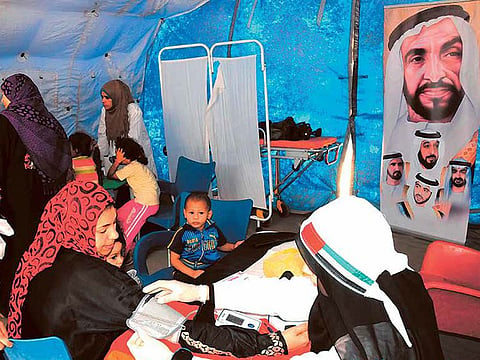UAE President Sheikh Khalifa: One man’s generosity eased the suffering of millions
UAE’s charity covered humanitarian crises and programmes to improve education and health

The UAE has been blessed with great wealth and throughout his life Sheikh Khalifa bin Zayed Al Nahyan endeavoured to share that good fortune with those in need, both through substantial personal contributions and developing the work of charitable institutions.
All over the world, people in dire straits have benefited from the UAE’s help. Sheikh Khalifa made sure that the UAE’s charity was not restricted to urgent humanitarian crises, but also included long-term programmes to improve vital sectors like education and health care.
“After observing the difficult humanitarian situations in many places around the world, we have made sure that the UAE’s philanthropic contributions are international,” Sheikh Khalifa said, describing how the UAE’s charity work has transformed into a long-term continuous effort to ensure sustainable development.
In addition, the UAE has an enviable record of getting effective and immediate aid to disaster zones. Sheikh Khalifa often spoke of the importance of the UAE’s emergency aid efforts delivering relief to victims of natural disasters. He worked hard to transform the UAE’s charity work into a foundation to ensure sustainability.
Emergency aid for refugees
As a result of this, the scale of the UAE’s aid is substantial. The UAE distributed more than Dh206 billion in international aid from 2010 to 2021, according to a report by the Ministry of Foreign Affairs and International Cooperation. The country was ranked the world’s leading development aid donor for four consecutive years, and second and fourth during the same period in other years.
Since the start of the COVID-19 pandemic, the UAE has sent more than 2,250 tonnes of medical aid to about 136 countries. The country has supported the World Health Organisation and the World Food Programme by providing half a million PCR test kits, valued at Dh36.7m.
Dh2.6 billion in emergency aid was given to millions of refugees and displaced people in 71 countries between 2009 and the first half of 2014, which included victims of natural disasters and conflict, according to official statistics. The report showed that the UAE provided food, water, shelter, sanitation, health care and other support services to many countries, including Pakistan, Syria, Afghanistan, Somalia, Libya and Palestine.
The UAE’s aid assistance has reached more than 137 countries and areas in the world and the UAE’s aid programmes are handled by 43 specialist institutions including governmental, non-governmental, humanitarian and charity bodies, which include 22 entities reporting the federal government.
Abu Dhabi Fund for Development
A long-established part of the UAE’s support for development is the Abu Dhabi Fund for Development, which during the first half of 2013, handled loans and grants worth to Dh58.4 billion which went towards financing 349 projects in 62 countries in the Middle East, Arab countries, North, East and Central Africa, South and Central Asia and others.
Some other UAE aid contributors include the Emirates Red Crescent, which donated around Dh8 billion in national and international aid between 1983 and 2013 in 100 countries, and the Zayed bin Sultan Al Nahyan Charitable and Humanitarian Foundation, which has donated more than $460 million since 1992 to various humanitarian projects in 96 countries.
Palestine
Several important recent examples of the UAE’s humanitarian work led by Sheikh Khalifa include the country’s remarkable response in building camps and supplying aid to the millions of refugees fleeing the vicious civil war in Syria, as well as its continuing support to the Palestinians in the Occupied Territories, for whom in 2014 Sheikh Khalifa ordered the allocation of an additional Dh192 million.
This money will be spent on urgent humanitarian aid in the Gaza Strip. UAE also continues to support nation-building efforts in Yemen.
The UAE has also launched a number of projects in Pakistan. All these programmes are coordinated by the UAE Pakistan Assistance Programme (UAE PAP) launched in 2011 after the disastrous floods. With an investment of $113 million, these projects include development, education, health, roads, bridges and water, as well as a special effort to help children in need.
Pakistan
The UAE PAP has developed a comprehensive redevelopment plan focusing on four main areas: Health, education, water and infrastructure. In Swat, the programme provided for the construction and rehabilitation of two bridges, 52 schools and 7 hospitals, as well as 64 water supply schemes.
The UAE PAP’s formation is typical of the way that the UAE has sought to offer its charity and humanitarian work through partnerships, which Sheikh Khalifa always stressed in the field of foreign aid.
Sheikh Khalifa always said that the UAE will continue to carry out its pivotal role in supporting international efforts in response to crises and disasters, and will continue to be a global role model for providing assistance to developing countries.
Sign up for the Daily Briefing
Get the latest news and updates straight to your inbox


